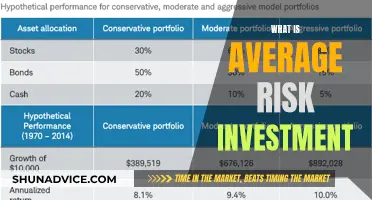
Private equity and public equity are two very different investment options. Private equity is a form of investment that takes place outside of the public stock market, where investors gain an ownership stake in private companies. Public equity, on the other hand, is a well-known and highly liquid option, where investors buy shares of public companies that are traded on stock exchanges. Private equity investments are usually high-risk, high-reward, and require investors to be accredited, with a certain minimum net worth. Public equity investments are generally safer and more readily available to all types of investors.
| Characteristics | Values |
|---|---|
| Risk | Private equity is considered a high-risk investment. Investors should be prepared to lose all their money. |
| Returns | Private equity has historically outperformed public equity and other asset classes. |
| Liquidity | Private equity is illiquid. Investments are tied up for long periods, often as long as 10 years. |
| Investor type | Private equity is geared towards sophisticated investors with a large amount of money to invest. |
| Investor requirements | To invest in private equity, you must be an accredited investor with a net worth of over $1 million or an annual income of over $200,000. |
| Investor control | Private equity investors have more control over the companies they invest in. |
| Investor protection | Private equity is not subject to the same regulations as public equity, and investors are unlikely to be protected if something goes wrong. |
| Market influence | Private equity is not influenced by the larger market. |
| Transparency | Private equity firms are not required to publicly disclose information about their funds. |
What You'll Learn

Private equity returns vs public equity returns
Private equity has historically outperformed public equity, but this is not always the case. Private equity investments are considered high-risk, high-reward, and investors should be prepared to lose their entire investment.
Private equity investments are not traded on public stock exchanges and are often targeted at high-net-worth individuals. They are a form of alternative asset class, and investors are usually wealthy sources such as institutional investors. Private equity firms encourage investment by boasting a greater return on investment (ROI) than other alternative asset classes or more conventional investment options.
Private equity investments have outperformed public equity over the last 25 years, with the Global PE Index outperforming the MSCI World Index by more than 500 bps annualised on a net basis. Over a 30-year period, US buyouts have generated average net returns of 13.1%, compared with 8.1% for an alternative private-market performance benchmark.
However, since 2009, US public equity returns have matched returns from US buyouts at around 15%. Over the past decade, returns from private and public equity have converged.
Private equity investments have higher fees, and they are also highly illiquid. It can take a year or more to sell investments in private equity. Private equity is best suited for investors with a high degree of risk tolerance.
Private equity firms take an active role in the companies they invest in, contributing to strategy and value creation. They are focused on the long-term and have the patience to undertake strategies and large investments that can take years to bear fruit. Private equity-backed companies exhibit higher growth and better margins than publicly traded firms.
Private equity funds have far more control over the companies they invest in, and they can make more active decisions to react to market cycles. This makes private equity funds more resilient during downturns.
Investment Trust Savings Schemes: How Do They Work?
You may want to see also

Private equity risk vs public equity risk
Private equity and public equity are two very different investment options, each with its own set of risks and potential rewards.
Private equity refers to an investment in a private company, often through private equity funds that cater to high-net-worth investors. These funds pool money from many individuals and then invest it in private companies. Private equity investments are usually considered high-risk, high-reward, with venture capital investments considered even higher in both regards. Private equity investments often have high minimum investment requirements, and investors should be prepared to potentially lose any money they invest. There is also a liquidity risk, as investors are expected to tie up their funds with the firm for several years, and the investments are highly illiquid. Private equity is also less transparent, as private equity funds aren't required to publicly disclose information.
On the other hand, public equity refers to ownership in publicly traded companies, which are available to anyone with an investment account. Public equity is widely known and highly liquid, making it a viable option for most types of investors. Publicly traded stocks are easily traded daily through public market exchanges. Public equity investments are generally considered safer than private equity, and they are also more readily available for all types of investors. Public companies are subject to regulation and are required to file regular financial reports, providing more transparency.
In terms of risk, private equity investments are considered higher risk due to the nature of the underlying investments. Private equity money is often invested in new companies or startups with significant growth potential, and there is a chance that these companies may not live up to expectations. Additionally, private equity investments often have high investment minimums, which can magnify gains but also magnify losses.
Public equity investments, on the other hand, are generally considered lower risk. Public companies are typically well-established and have a track record of financial performance, reducing the uncertainty associated with private companies. Public equity investments are also more accessible, as anyone with an investment account can participate.
In summary, private equity investments offer the potential for higher returns but come with higher risks, lower liquidity, and higher fees. Public equity investments are generally considered safer, more liquid, and more accessible, but may offer lower potential returns. Investors should carefully consider their risk tolerance, investment goals, and financial situation before deciding whether to invest in private or public equity.
Financial Planning and Investment Management: What's the Difference?
You may want to see also

Private equity liquidity vs public equity liquidity
Liquidity is a key consideration when deciding whether to invest in private or public equity.
Public equities are traded on stock exchanges, providing liquidity as they can be bought and sold at any time. Formal exchanges and public markets are generally highly liquid, although liquidity may be limited depending on the exchange.
Private equity, on the other hand, is considered illiquid. Private companies are not traded on stock exchanges, and it is typically much more difficult to buy and sell them. Private equity funds are not registered with the Securities and Exchange Commission and are therefore not subject to public disclosure requirements, making it harder to access information about them.
Private equity funds have a limited lifespan, typically 10-12 years, and investors may need to hold their investment for the long term. During this time, the private equity firm will invest in various private equity instruments, such as buyouts or venture capital, with the aim of selling the companies at a profit. This process can take time, and investors' cash may be tied up until a liquidity event occurs, such as a sale or IPO.
That said, some liquidity exists in private equity funds as part of the capital-raising and distribution processes. The capital-raising process can take 1-3 years for an investor to become fully invested, and the distribution process can begin returning capital to investors after about 5-7 years as target assets are sold.
While private equity investments may offer higher returns, they are also high-risk, and investors should be prepared to lose all their money.
H1B Visa Holder? Smart Investment Strategies for Your Savings
You may want to see also

Private equity diversification vs public equity diversification
Private equity investments can play a pivotal role in diversifying and enhancing a portfolio's returns. Private equity funds allow investors to combine their assets to invest in private companies, typically in a company or business. Private equity investments can be made in mature companies or early-stage startups.
Private equity is a way for accredited investors and institutional investment firms to diversify their portfolios and take on more risk in exchange for potentially higher returns than they might achieve by investing in public companies. Private equity funds are generally only open to accredited investors, who tend to have a large amount of money to invest and can tolerate the risks of private equity investments.
Private equity investments are usually considered high-risk, high-reward investments. They are illiquid and tend to have higher fees than public equity investments. Private equity funds are not registered with the Securities and Exchange Commission and are therefore not required to publicly disclose information about their funds.
Public equity, on the other hand, refers to ownership in publicly traded companies, which are available to anyone with an investment account. Publicly traded stocks are easy to invest in, as all that is needed is a brokerage account. Public equity investments are generally considered lower risk and have lower fees than private equity investments.
Both private and public equity can help investors make money, and it is important to diversify a portfolio by including many different assets. A thoughtful approach to portfolio construction is essential for successful private market investments. Institutional investors typically allocate 5-30% of their portfolios to private equity and other private market assets. For private wealth investors, a common strategy is to start with a smaller allocation, such as 5-10%, and increase it over time.
Understanding Favored Nation Clause in Investment Management Agreements
You may want to see also

Private equity investor requirements vs public equity investor requirements
Private equity and public equity differ in several ways, and these differences are reflected in the requirements for investors in each.
Private Equity Investor Requirements:
- High net worth: Private equity investments typically require a large amount of capital, with minimum investment requirements ranging from $25,000 to $25 million.
- Accredited investor status: In the US, private equity investors must be accredited, with specific requirements around income and net worth.
- Long-term commitment: Private equity investments usually have a long time horizon, often 10 years or more, and investors need to be prepared to hold their investment for this duration.
- High-risk tolerance: Private equity is considered a high-risk, high-reward investment, and investors should be aware that they could lose all their money.
- Limited liquidity: Private equity investments are often illiquid, and investors may have limited ability to withdraw their investment before a specified time period has elapsed.
- Active involvement: Private equity firms often take a controlling interest in the companies they invest in and may require investors to be involved in decision-making and management.
- Conflicts of interest: Private equity firms may have interests that conflict with those of the funds they manage, and investors need to be vigilant about potential conflicts and their impact.
Public Equity Investor Requirements:
- Lower capital requirements: Public equity investments, such as stocks, are more accessible to individual investors as they can be purchased through brokerage accounts with no minimum investment requirements.
- Easier access: Public equities are traded on stock exchanges and are therefore more readily available for anyone to buy and sell.
- Lower risk: Public equities are generally considered lower risk than private equities, as they are typically well-established companies with more transparent financial disclosures.
- More liquidity: Public equities can be bought and sold at any time, providing investors with greater flexibility and the ability to realise returns more quickly.
- Less control: Public equity investors have a marginal level of control and often do not have the same active ownership role as private equity investors.
- More regulation: Public equities are subject to regular public disclosure requirements and are generally more transparent, providing more information for investors to base their decisions on.
In summary, private equity investments have more stringent requirements in terms of capital, investor status, time commitment, and risk tolerance. They also offer potentially higher returns and a more active role for investors. Public equity investments, on the other hand, are more accessible, lower risk, and provide greater liquidity, but may offer less control and involvement for investors.
A Guide to Investing in Indian REITs
You may want to see also
Frequently asked questions
Private equity is an investment in a company that is not publicly traded, whereas public equity is an investment in a company that is publicly traded on a stock exchange.
Private equity has historically generated greater returns than public equity. Private equity firms have more control over the companies they invest in and can add value by upgrading management, introducing new products or services, or entering new markets. Private equity can also help to diversify a portfolio and mitigate risk.
Private equity is a high-risk investment and is not suitable for everyone. It is illiquid, with investments typically tied up for a long period, such as 10 years. Private equity firms are not required to publicly disclose information about their funds, so there is a lack of transparency. The fees associated with private equity investments can also be high, reducing returns.







